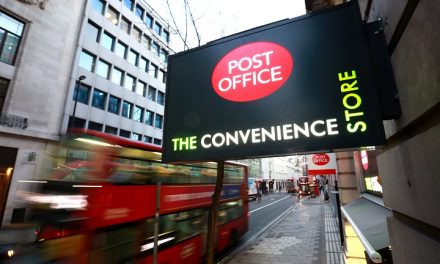
Post Office Ltd being forced into “unsuitable” business, says pamphlet
The UK government is forcing the Post Office Ltd network into an “unsuitable” business model, according to a white paper highlighted by the Communication Workers Union. The pamphlet issued by the Postbank Coalition secretary Lindsay Mackie yesterday said the Post Office network should expand only in four main areas beyond its current service portfolio – financial services, ecommerce, government services and assistance for small businesses.
It said UK post offices were “perfectly placed” to provide banking as UK banks shrink their brick and mortar retail networks, while for ecommerce post offices should become “the depository and pick up centre for parcels”.
Mackie criticised the government for doing “nothing” about its 2010 promise to provide more services via post offices, instead withdrawing services like National Savings accounts and handing the Green Giro service to private sector firm PayPoint.
Regarding small businesses, her pamphlet said post offices were needed for firms to manage finances and access other services locally.
Within a pamphlet that argued there was “no need” for Royal Mail to be privatised under the new regulatory regime of Ofcom, Mackie criticised current government plans for the Post Office network.
Mackie suggested that turning post offices into “Main” and “Local” branches depending on local demand for services would result in a “diminished network of far less than the 11,500 post offices we now have, and a skeletal service administered not at post office counters manned by trained staff, but at retail counters along with the cat litter and baked beans.”
The Postbank Coalition secretary said the government should establish post offices as an “economic and social network which helps underpin local communities”.
NFSP
The National Federation of SubPostmasters (NFSP) held its annual conference last week, stating support for the government’s proposal for mutualising the Post Office, putting the network into the control of postmasters.
But the organisation has mounted a campaign to urge ministers to ensure that government services continue to be provided by the Post Office network. Specifically, the NFSP is pushing for a new contract from the Drivers and Vehicle Licensing Agency to be awarded to Post Office Ltd later this summer.
Bhavna Desai, who was elected NFSP president last week, said: “The post office is a precious national asset and must therefore be supported by government, both nationally and locally, through more work and by thinking post office first.”
Minister
Speaking at the NFSP conference last week, Britain’s postal affairs minister Norman Lamb insisted that Post Office Ltd was making progress in picking up government services contracts.
Lamb said with Post Office Ltd now no longer a subsidiary of Royal Mail, but a separate sister company as of last month, the government would push for new revenue generation from financial services and other products, and reduce operating costs particularly at Crown post offices (those owned by Post Office Ltd).
But he also stressed the need for change in the network so it could compete for contracts.
“There is now a pressing need for change as the current network model is no longer fit for purpose,” he said, backing the move to Main post offices and Local branches.
A national rollout of the network transformation programme, involving around 6,000 of the 11,500 branches nationwide is set to begin this summer, Lamb confirmed.
He said: “To compete effectively in a highly competitive and fast-changing retail environment, the network must adapt to customer and market demands – longer opening hours, quicker service, and accessible locations.”
Lamb also said that a new Stakeholder Forum will now be set up to begin the next steps towards mutualising Post Office Ltd.












